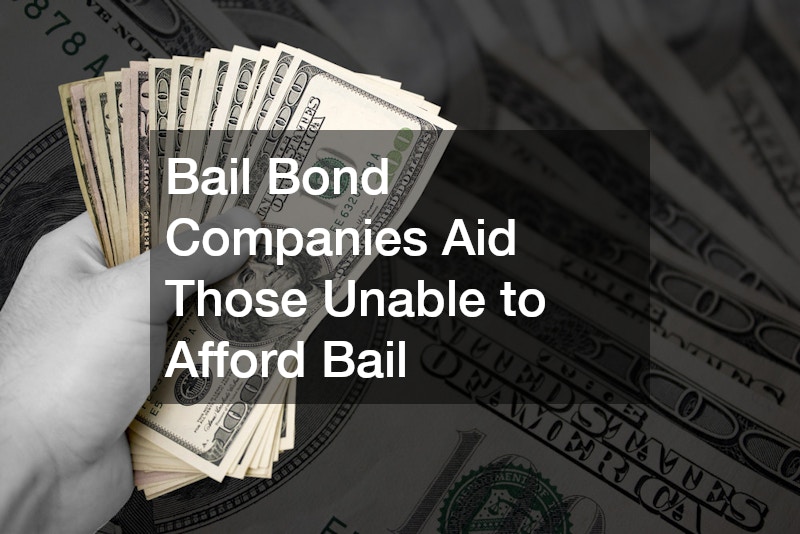Bail bond companies play a crucial role in the judicial system, providing a bridge between incarceration and freedom for many defendants. They are instrumental in offering financial solutions for individuals who otherwise might not be able to afford to post bail.
These companies ensure that individuals accused of crimes can effectively participate in their defense while awaiting trial. By providing these services, bail bond companies sustain the legal principle of innocent until proven guilty.
Despite their significance, the operations of bail bond companies often raise questions about fairness, cost, and accessibility within the judicial system. Understanding these roles and impacts is essential for evaluating their place in modern legal practices.
How Do Bail Bond Companies Work?
Understanding the Bail Process
The bail process allows defendants to be released from custody while awaiting trial, ensuring they appear in court as scheduled. Bail amounts are generally set by judges based on factors like the severity of the crime and flight risk assessment.
In situations where the set bail is beyond the defendant’s financial reach, bail bond companies step in to provide the necessary funds. They charge a non-refundable fee, often a percentage of the total bail amount, to post a bond on the defendant’s behalf.
This arrangement allows individuals to gain temporary freedom, providing an opportunity to prepare for upcoming legal proceedings. By facilitating the bail process, these companies play a pivotal role in maintaining the balance between detention and civil liberties.
Agreements Between Bail Bond Agents and Defendants
The agreements between bail bond agents and defendants involve specific obligations, including financial commitments and court appearance guarantees. Defendants must adhere to all court dates to avoid forfeiting the bond.
Agents typically require co-signers or collateral to secure the bond, providing a layer of security against defaults. These agreements are legally binding and carry significant implications for both the defendant and their co-signers.
Failing to comply with these agreements can lead to severe financial repercussions, including the loss of collateral such as property or other assets. Thus, understanding these commitments is critical for defendants and their families.
What Are the Benefits of Using a Bail Bond Company?
Financial Advantages
Using a bail bond company can offer significant financial relief to families who cannot afford the full bail amount. These companies provide options like payment plans, making it easier to manage the financial burden of unexpected legal fees.
Instead of paying the entire bail amount upfront, families can pay a fraction of it, usually 10%, as a fee to the bail bond company. This arrangement can make a substantial difference, especially for those facing financial constraints during legal challenges.
Furthermore, the availability of bail bond services ensures that the legal system remains accessible to people of varied economic backgrounds. By lowering the upfront costs, these services promote a more equitable access to justice.
Expedited Release from Jail
Bail bond companies facilitate the faster release of defendants compared to traditional methods of paying full bail amounts. Their ability to quickly process paperwork and post bonds ensures a swift transition from detention to freedom.
This expedited release allows defendants to resume their daily activities, including work and family obligations, while awaiting trial. It also provides them with ample time to coordinate with their legal counsel for an effective defense strategy.
Quick releases are particularly beneficial in reducing overcrowding in detention facilities, which can be a significant concern in many jurisdictions. By minimizing the time spent in jail, bail bond companies contribute to more efficient judicial processes.
What Are the Risks and Downsides of Using a Bail Bond Company?
Financial Risks and Penalties
One of the primary risks associated with bail bond companies is the potential financial loss if the defendant fails to appear in court. In such cases, any collateral offered by the defendant or co-signer may be forfeited.
Moreover, the non-refundable fee paid to the bail bond company represents a permanent financial outlay, regardless of the case outcome. This can become a significant expense for families, adding to the financial strain of legal proceedings.
The financial risks are compounded by the potential for increased debt or loss of valuable assets, such as homes or cars. Therefore, it is essential for families to carefully consider these potential drawbacks before engaging with a bail bond company.
Legal and Ethical Concerns
There are ongoing legal and ethical concerns regarding the operations of bail bond companies, particularly related to their high fees and business practices. Critics argue that these companies profit disproportionately from individuals who are unable to post bail independently.
Additionally, the bail system itself has been scrutinized for perpetuating inequality, as those unable to afford bail remain incarcerated, while others with financial means can secure their release. This disparity highlights broader issues within the justice system.
The ethical implications of bail bond operations also touch on how justice is administered, raising questions about access and fairness. It is crucial to assess these concerns when considering reforms to the bail and judicial systems.
Bail bond companies play an integral role in the criminal justice system by providing accessible solutions for individuals unable to post bail. They offer financial and procedural advantages that can ease the legal burdens on defendants and their families.
However, these advantages must be weighed against the potential financial and ethical risks involved in using such services. The landscape of bail bonds requires careful consideration and informed decisions to ensure fairness and justice for all individuals.
Ultimately, the discussion on bail bond companies is part of a larger dialogue about the need for reform and equitable access within the judicial system. Their role and impact remain a critical area of examination for policymakers and advocates alike.





